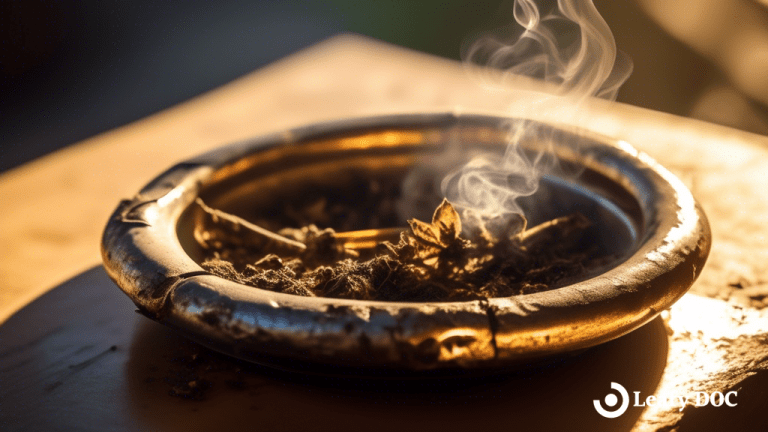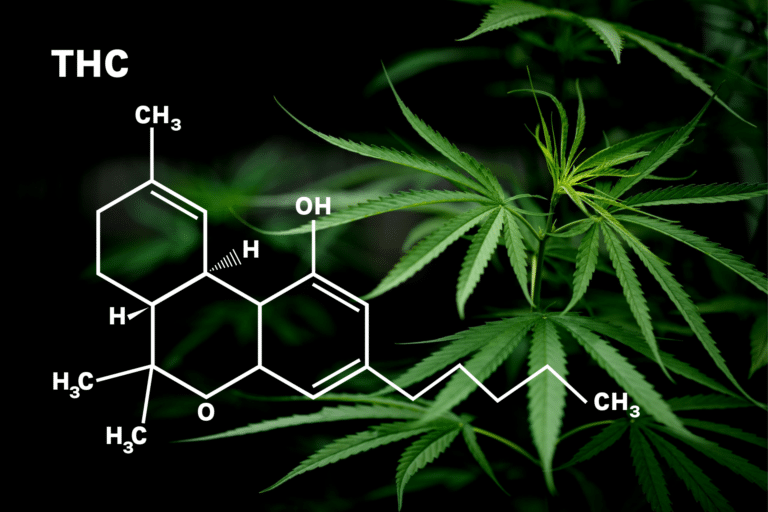The Health Benefits of Marijuana Tea
by Haley Mills · November 14, 2022
Marijuana tea has many benefits, but there are also some potential side effects. Learn more about the possible side effects of marijuana tea and how to avoid them.

Marijuana tea has been around for centuries. Chinese emperor Shennong was one of the first to use weed tea for its medicinal benefits over 4,000 years ago. The tradition of using cannabis stems to make tea for medical and recreational purposes spread to Egypt, India, and the Caribbean. Many Jamaican mothers use cannabis tea to relieve pregnancy-related symptoms like nausea, muscle aches, and anxiety.
Read on to learn more about marijuana stem tea, how to make your own and what brands to try this year.
What is the Endocannabinoid System?
Marijuana tea interacts with our bodies’ ECS. The endocannabinoid system comprises an extensive network of chemical signals and cellular receptors densely packed throughout our brains and bodies. The “cannabinoid” receptors in the brain — the CB1 receptors — outnumber many other receptor types in the brain.
They act like traffic cops to control the levels and activity of most of the other neurotransmitters. This is how they regulate things: by immediate feedback, turning up or down the movement of whichever system needs to be adjusted, whether hunger, temperature, or alertness.
Our bodies produce molecules called endocannabinoids to stimulate these receptors, which have a structural similarity to molecules in the cannabis plant. The first endocannabinoid discovered was named anandamide after the Sanskrit word ananda for bliss.
All of us have tiny cannabis-like molecules floating around in our brains. The cannabis plant, which humans have been using for about 5,000 years, essentially works by hijacking this ancient cellular machinery.
What does the ECS do?
The endocannabinoid system regulates learning and memory, emotional processing, sleep, temperature control, pain control, inflammatory and immune responses, and eating. This vital system is currently at the center of renewed international research and drug development.
What is a Cannabinoid?
Cannabinoids are found in the cannabis plant and are produced naturally by the human body. We have an endocannabinoid system (ECS) that internally produces cannabinoids.
The two most commonly known cannabinoids found in cannabis are tetrahydrocannabinol (THC) and cannabidiol (CBD). The word cannabinoid can refer to THC or any chemical that acts on cannabinoid receptors. These cannabinoids are infused into marijuana tea to offer the benefits of cannabis without smoking it.
What Does a Cannabinoid Do?
Cannabinoids from the cannabis plant have been used for hundreds of years to alleviate symptoms of different health ailments. They act on and bind to cannabinoid receptors in the body and trigger different responses.
Specific receptors can be used to manage medical conditions when using cannabis. For example, they have been known to help with diseases such as Alzheimer’s, epilepsy, relieve chronic pain, and cancer by reducing inflammation.
Cannabinoids mimic a natural endocannabinoid system like anandamide, which are fatty acids that activate cannabinoid receptors. Cannabinoids bind themselves onto fat-soluble molecules that enter a cell’s lipid bilayer.
Cannabinoids then attach themselves to what are called CB1 and CB2 receptors. When the proper connection between cannabinoid and receptor is made, the body is stimulated to have a detailed response.
Psychoactive Effects Of Cannabinoids
The effects of cannabinoids vary from person to person, depending on an individual’s biology and cannabinoid receptor type. Not everyone experiences the same results when consuming cannabinoids, and the intensity of those effects also varies.
Some people feel relaxed and happy after cannabinoid consumption, while others may feel sleepy or tired. It is important to remember that cannabinoid use should be approached cautiously, as it can have adverse side effects, especially when consumed in high doses.
If you are thinking of trying cannabis or its cannabinoid chemicals, it is best to speak with a healthcare professional who can help you determine which strain and dosage would be best for you. The best cannabis strain to choose depends on the effects you’re looking for; however, some strains have sweeter seeds and better flavor profiles than others, making them ideal for cannabis-infused drinks.
Factors Influencing the Psychoactive Effects of Cannabinoids
Several key factors can shape the nature and intensity of the high experienced from cannabinoids, particularly when consumed in forms like marijuana tea:
- Strain of Marijuana: The particular strain you use matters. Sativa strains often produce a more uplifting, energetic sensation, while Indica strains are associated with relaxation and sedation. Hybrid strains can blend these effects.
- Dosage: The amount of cannabis used has a substantial impact. Lower doses generally lead to milder effects, whereas higher doses can intensify both the positive and unwanted effects.
- Individual Tolerance: Each person’s sensitivity to cannabinoids is unique. What feels manageable or mild for one might be overwhelming for another. Understanding your own response is key to a comfortable experience.
As always, start low and go slow, especially if you’re new to cannabis or trying a new preparation method.
What are the benefits of infused tea?
If you enjoy a daily wake-and-bake session, mixing caffeinated tea could take that high to the next level. Weed stem tea offers those same benefits, but you don’t have to smoke to get them.
A good thing about cannabis-infused tea is that it’s discreet. You can pour it into a travel mug to drink on the way to work or sip throughout your day, stirring occasionally.
Depending on your plans, you can adjust the THC content to provide calm and focus rather than put you in a fog. Alternatively, certain weed tea brands are made for nighttime use, which can help you relax, like rolling up a joint or eating cannabis edibles before bed to relieve pain.
side effects of marijuana’s tea
Mixing cannabis with tea doesn’t have any specific adverse effects that have been reported; however, people experience varying reactions. If you’re generally not so good with handling THC, it could create feelings of anxiety and paranoia, which would offset the desired effect.
Nevertheless, if you love hot or cold tea, adding ground cannabis to your morning routine might enhance its energizing. CBD strain options are also available if you’re mainly looking for flavor enhancement.
We recommend reading labels beforehand and asking a healthcare professional about your exact dose. Allow at least half an hour before you increase the dosage to see if it’s for you before going all in. Monitoring your personal effects allows you to reflect on your feelings during and after the experience. Keeping track will enable you to analyze whether weed stem tea is good for you.
Will Weed Stem Tea Appear on a Drug Test?
Yes, drinking marijuana tea can result in a positive drug test. Most standard screenings are designed to detect THC (tetrahydrocannabinol), the psychoactive compound in cannabis. Whether you inhale, eat, or drink cannabis, your body processes THC into metabolites that can remain in your system for days or even weeks. Factors like metabolism, frequency of use, and dosage all affect how long THC is detectable.
If you have an upcoming drug test, consider avoiding cannabis altogether or choose CBD-dominant strains with little to no THC. Some drug tests look specifically for THC, while others may detect broader cannabinoid presence, so it’s worth asking what type of test is being used.
Being aware of how marijuana tea affects testing can help you enjoy it without unwanted surprises.
What are binding agents?
Cannabinoids aren’t water-soluble, so they need to bind with another chemical to be absorbed into the human body. As the name suggests, binding agents absorb cannabinoids and transport them throughout your body.
Without a binding agent, cannabinoids can’t get into your bloodstream or brain. Binding agents can easily be found around the house or in a local grocery store.
Here are five of the most common binding agents:
- Butter
- Whole milk
- Half-and-half
- Coconut milk
- Coconut oil
Weed Stem Tea Recipe
If you have leftover stems, you can follow this simple recipe for weed stem tea.
Ingredients:
- 1/4 cup of cannabis stems (or other cannabis plants’ parts)
- 1 Tbsp of a fat-soluble binding agent (coconut milk, whole milk, etc.)
- Your loose-leaf herbal tea of choice
Directions:
- Decarb your stems before steeping or grind them before boiling, depending on your preferred brewing method.
- Boil 1 1/2 cups of water
- Add the binding agent to the water before inserting the stems with your tea into the infuser.
- Steep the infuser in hot water for ten minutes. You can steep the tea and stems in separate bags or put one in a coffee filter machine to avoid combining the stemmy flavors. Next, there’s just drinking weed tea left on the agenda.
Best Cannabis Tea Brands 2022
- Mello Mint Stillwater
- KIKOKO Organic Chamomile Lemon Myrtle
- Skyline Boulevard Co
- Honey Lemon by Canna Tea
- TopLeaf Canada
Dosage Information
Please follow this guide if you’d like to learn the math behind dosing for cannabis-infused recipes. Using this handy THC hack is your best bet because you won’t have to come up with your formula:
1 – 2.5 mg THC
This dosage will yield a mild, mellow effect. This dosage can positively affect stress, anxiety, and body pain—suitable for first-time or occasional users who want a casual experience.
2.5 – 15 mg THC
This dosage will have a moderate to strong effect. A more substantial impact on stress, anxiety, pain, etc. Suitable for those with pain or looking for help with sleeping.
30 – 50 mg THC
This dosage will produce a more robust, more intense response for those not ingesting cannabis. For others, this may be the perfect dose, depending on body chemistry and tolerance.
50 – 100 mg THC
This dosage range is very high and will result in a powerful, quite intense experience. Often these doses are for very experienced consumers or those with medical conditions such as cancer and severe chronic pain.
How to Infuse A Caffeinated Tea
Most of us know how to use at least one tea brewing method. Next, you’ll need some weed-infused butter or coconut oil.
What you’ll need:
- One tablespoon of cannabis butter or cannabis coconut oil
- Two cups of hot (not boiling) water
- ⅓ cup of loose-leaf tea
- Reusable Tea Bag (optional)
Directions:
- Boil the hot water
- Gently stir in your loose-leaf tea and cannabutter or coconut oil
- Let the mixture steep for four to five minutes
- Remove from the burner, pour the hot tea into your favorite mug, add some sweet cannabis milk, and enjoy!
Is Marijuana Tea Legal?
The legality of marijuana tea depends entirely on where you live. In places with legalized medical or recreational cannabis—such as California, Colorado, Canada, or the Netherlands—you can generally brew and enjoy it without issue, and in some regions you can even buy ready-made cannabis tea from licensed retailers.
In areas where cannabis is still prohibited, making or drinking marijuana tea can lead to legal consequences, even if you’re only using stems. Laws change often, but not always at the same pace everywhere.
To stay safe:
- Check your state, province, or country’s cannabis laws before making marijuana tea.
- Keep in mind that cannabis laws apply to both store-bought and homemade recipes.
- Stay updated, as regulations can shift quickly.
Knowing your local rules is the best way to enjoy marijuana tea responsibly.
Is Medical Marijuana Tea Right for You?
Drinking marijuana-infused tea may be an excellent addition to your best morning or nighttime ritual. With this unique combination of chemicals’ heightened cerebral and body effects, you may feel on top of the world and relieved of chronic pain and stress.
Take a sip, then a deep breath, and allow yourself to become centered before beginning the day’s challenges or to relax after a long day. If you try it, it also may not be for you. That’s okay too! The point is to work towards self-care and inner peace, so it’s worth taking a chance on cannabis tea.
Last Updated: August 11, 2025
Get Approved for Your Medical Marijuana Card in Minutes!

Get Your Medical Card
Connect with a licensed physician online in minutes

Like This Article?
Share with your friends
Table of Contents
Keep Reading
-
CBD Sunscreen The Best Options For Safeguarding Your Skin
Discover the ultimate CBD sunscreen options that take your skincare routine to the next level. Shield your skin from the sun’s harmful rays today!
-
How Long Does A Weed High Last
Find out the real duration of a weed high, from minutes to hours! Don’t miss this eye-opening article and satisfy your curiosity today. Click now to uncover the truth!
-
Your Guide to High-THC Cannabis Strains
Learn what constitutes as “high-THC” cannabis and the effects it has on users.



